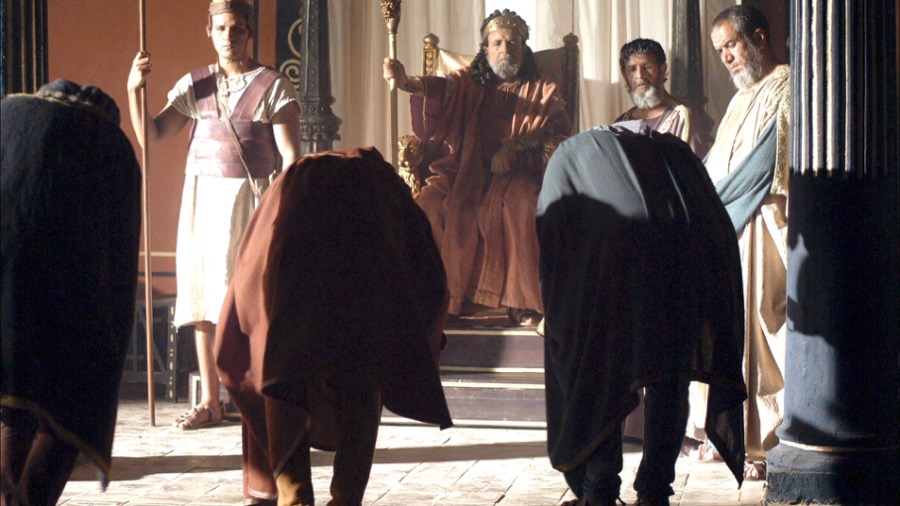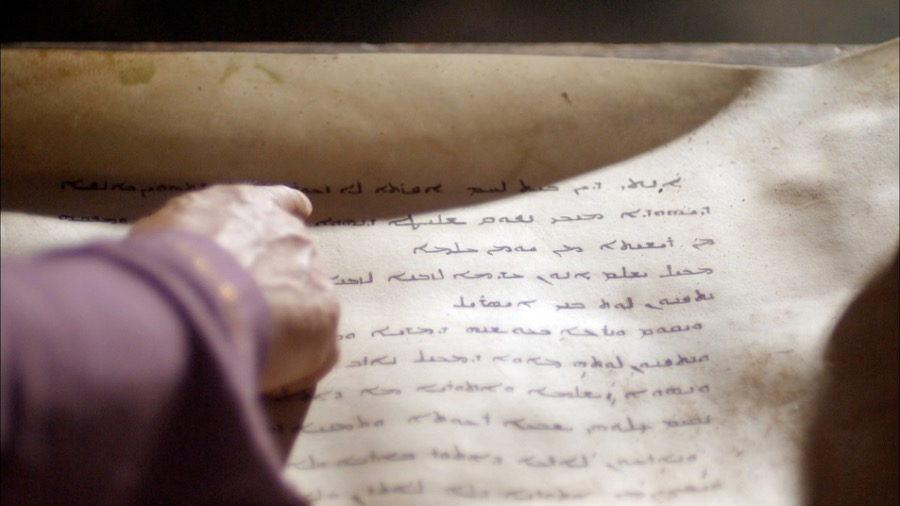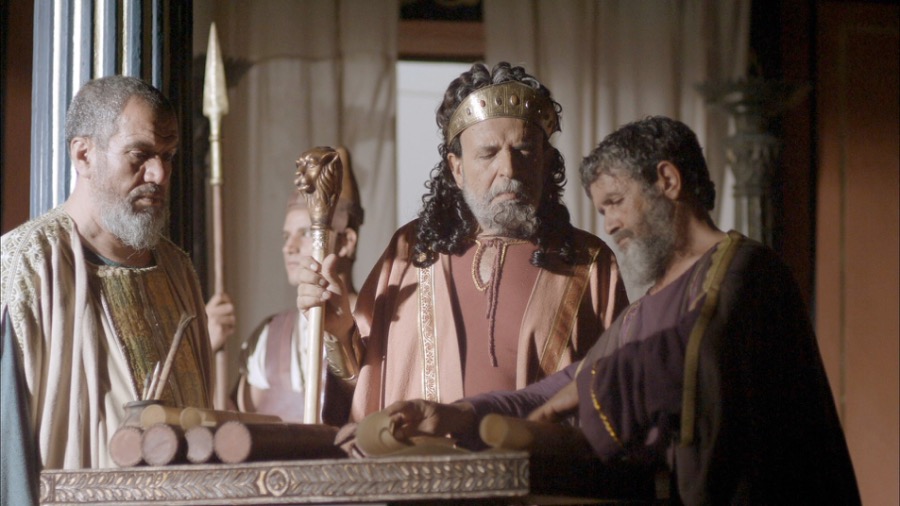If we allow the story to speak for itself, however, we discover that Matthew reminds us of the gritty and dangerous world Jesus entered to redeem. Matthew also challenges us to make a difficult choice about Jesus. He makes clear that this decision could have life and death consequences for us and those around us. It certainly had those ramifications for Joseph, Mary, Jesus, and baby boys of Bethlehem.
What is this life-altering choice?
Matthew isn't looking for a simple fill-in-the-blank answer from us. For most of us, deciding between religion or Jesus isn't hard. We'd choose Jesus every time we were asked in a poll or a fill-in-the-blank questionnaire. However, Matthew wants each of us to look at our lives and our spiritual practices. Do they reflect my choice of Jesus over religion? Do my religious actions match my words? Do I put my life where my mouth is?
At first glance, the story of the wise men appears simple, even sweet. Jesus has been born. His parents have moved from the stable into a house in Bethlehem (Matthew 2:1, 9-11).
Meanwhile, hundreds of miles away, a group of wise men sees a star. Using their religious practices involving astrology—practices that are forbidden in the Law of God—they determine this celestial event signaled the birth of the King of the Jews. They pack up their treasures and begin the long journey from Persia (Iran) to Jerusalem. They are determined to come and worship the child, Jesus, and give him gifts worthy of a king (Matthew 2:2).

The journey of the wise men leads them to King Herod in Jerusalem. He is a ruthless ruler willing to protect his power and position at any cost. When the wise men ask Herod about the birth of the newborn "King of the Jews," Herod plays coy with the wise men. He is furious and even more determined to snuff out this possible new rival to his throne (Matthew 2:3-4).
Herod makes two moves to stop this perceived threat.
First, he calls in his "leading priests and teachers of the religious law." These guys know the Scriptures forward and backward. Herod uses their incredible knowledge of God's revealed word to ascertain where the Messiah was to be born (Matthew 2:4). "In Bethlehem in Judea" they answered and then quoted the words of the prophet Isaiah (Matthew 2:5-6). Once Herod has this information, he makes his next move.
Second, he calls the wise men back to him for a private meeting. He gets information on when the star first appeared. He then told them to go to Bethlehem and carefully search for the child. After they found him, they were to return and tell him all the details. Then, Herod tells one whopper of a lie, one so big it had to make the devil smile. Herod informed the wise men that he wanted to go and worship the child (Matthew 2:7-8).

As the story unfolds, the wise men follow the star to Bethlehem. They find the house where Mary, Joseph, and "the child"[CHILD] are staying. They pull out their treasures, give him their gifts, and worship this small child (Matthew 2:9-11). Being warned by God in a dream, they return home without tipping off Herod to Jesus and his family's whereabouts (Matthew 2:12).
After the passage of time, Herod realizes the wise men had deceived him. He became even more livid. His ruthless and brutal desire to eliminate any rival to his throne expresses itself through genocide. He has all the male children under two years of age in the Bethlehem area murdered. He determined his innocent targets according to when they had been born based on the time window he had ascertained from the wise men (Matthew 2:16-18).

Matthew deeply loved the Hebrew scriptures. He told his story of Jesus and the wise men emphasizing how the events fulfilled Old Testament prophecies.[SCRIPTURE] However, Matthew also reminds us of an essential truth. We can know the scriptures, they can be the heart of our faith, yet we can use them to oppose the very work of God we claim is important to us. We can give up Jesus to our religious beliefs and practices while those who are far away and in false religions can come looking for Jesus and find him.
In Matthew's story, members of a forbidden religion rooted in astrology—the wise men—made the long journey from their country to Jerusalem and then to Bethlehem. They did this at significant cost and considerable risk. They did what we as believers should be doing; they brought the child, Jesus, gifts and bowed down and worshiped him. They are the heroes in this story in Matthew's gospel, the gospel most rooted in Jewish history, faith, and prophecy. The wise men choose Jesus over their religion.

Meanwhile, the religious leaders in the center of Israelite faith, Jerusalem, use the holy scriptures to help Herod determine where the Messiah will be born. Herod then uses this knowledge to try and kill God's Son, the Messiah, Jesus. Herod and his advisers choose their religion, their religious places, and their religious power, over seeking Jesus!
What are we to make of Matthew's story of the wise men?
What is the Holy Spirit trying to say to us in this precious, yet brutal, story about Jesus and his place in our lives?
And, how do we compare to the two groups who had to choose between Jesus or religion?
Today, people use several questions to determine if that person is genuinely "good." Christians often add a fourth.
- Do they do nice things?
- Do they associate with reputable people?
- Do they live morally decent lives?
- Do they believe what the Bible says?
In their mind, the religious leaders could answer a strong "Yes!" to all those questions:
They hung out with other people like themselves. They didn't "smoke, drink, or chew and didn't run around with folks who do"! (This old saying describes the attitude many of us grew up being taught in our conservative Christian homes.)
They lived lives avoiding getting close to a violation of God's laws. They were fastidious in obeying God's Law. They created extra commands to build a hedge around the Law to prevent themselves from even getting close to an act of disobedience.
They not only believed what the Bible said, but these religious leaders also had most, if not all, of what we call the Old Testament — The Torah, The Prophets, and The Writings — memorized.

However, most of them refused to seek Jesus. They found ways to explain away his miracles. They disdained the people Jesus chose to serve and to be his friends. They criticized him for not obeying all their extra rules to ensure holiness. In fact, most of the religious folks in Jesus' day opposed him. The Lord eventually told them something shocking to them, something we must also hear:
You study the Scriptures diligently because you think that in them you have eternal life. These are the very Scriptures that testify about me, yet you refuse to come to me to have life (John 5:39-40).
The real question for you and me is simple: Am I more like the wise men who passionately sought to find Jesus or the religious leaders who chose their traditions, positions, and power over Jesus?
When I read any passage of scripture, do I:
- Ask Jesus to reveal himself and his will to me?
- Obey, rather than try to explain away what he asks of me?
- Pray for the Holy Spirit to help me to know what Jesus wants me to know, feel, and do with what I learn?
- Filter what I've read through the lens of Jesus trusting that Jesus is God's ultimate message and that what Jesus taught and how Jesus lived is my example for understanding all the Scriptures and for living my life as his disciple?
- Yearn to experience his power and presence in my daily life?
- Worship him and bring him my gifts to honor him?
- Trust that no matter where I am, where I have been, or how I struggle, he longs to come to me and share life with me?
Jesus comes to us and makes us an incredible promise:
Look! I stand at the door and knock. If you hear my voice and open the door, I will come in, and we will share a meal together as friends (Revelation 3:20 NLT).
Jesus' promise to believers, to Christians—for you and me, for those of us who yearn to find Jesus and live for him. The Lord wants to do life with us. However, we must seek Jesus above our religious practices, cherished traditions, denominational loyalties, organizational titles, and cultural preferences. We must come to Jesus opening the door of hearts to his power and presence.
There's no better time than now to seek Jesus and open our hearts to him. Let's join the wise men in seeking "the child" God sent. He's not far from us. We don't have to go on a long trek across the desert chasing a distant star.

Jesus is at our door. He's knocking. Come on, let's open up and invite him to stay!
[CHILD] This title for Jesus is found in Matthew 2:8, 9, 11, 13, 14, 20, 21 [twice in verses 13 & 20]). I believe that Matthew uses "the child" to help us understand how vulnerable Jesus was as he entered our world for us even though he also identifies him as "Jesus" (Matthew 2:1), "King of the Jews (Matthew 2:2), "the Messiah" (Matthew 2:4), "ruler" (Matthew 2:6), "the Shepherd" (Matthew 2:6), God's "Son" (Matthew 2:15), and "a Nazarene" (Matthew 2:23).
[SCRIPTURE] Matthew emphasizes the fulfillment of prophecy often in his gospel. Notice in this one story alone (Matthew 2:1-23) that he emphasizes fulfillment several times (Matthew 2:4-6, 15, 17-18, 23).
Special thanks for the use of the Jesus images in Phil's blog, "The Jesus Window," to Free Bible Images and the The Lumo Project.







Reader Comments
Archived Facebook Comments